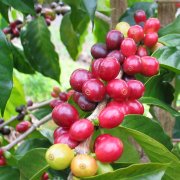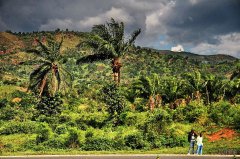What are the characteristics of Kenyan coffee beans
There are two types of coffee farms in Kenya. One is a large plantation that covers an area of more than five acres, but the average elevation is low. In the case of Kenyan coffee, the coffee beans of the large farms are of medium quality. The best Kenyan beans come from small farms, most of which are located in the foothills or volcanic slopes above 5,000 to 6,000 feet. Each small farmer has a capacity of only 20 to 70 bags per season and cannot afford to invest in expensive washing plants, but small farmers are very United. Hundreds or thousands of households are gathered to set up a cooperative farm, which is funded by the government to build a washing treatment plant, and the coffee fruits picked by small farmers are sent to the cooperative farm for unified processing. First remove the half-ripe or rotten fruit, then peel, ferment, decompose the flesh, remove the coffee beans, then dry and polish, the whole process is supervised by the official Coffee Administration, which ensures the quality of Kenyan coffee. Kenya bean washing processing technology and high standards of quality control, has always been an example of bean-producing countries.
Kenyan coffee fruit
Don't underestimate the small farmers in Kenya, they are just like ants, and their overall production capacity is higher than that of large farms, about six to four, which is quite rare in bean-producing countries. Kenyan coffee is widely appreciated by connoisseurs, thanks in large part to small farmers guarding the foothills and producing high-quality coffee. In addition, Kenya beans must have a strict grading system. Coffee beans taken out by washing plants are divided into five grades according to size, shape and hardness, with the highest being PB, followed by AA++, AA+, AA and AB. This grading system is similar to Colombia, mainly in terms of particle size and shape, but selling well does not necessarily lead to good flavor. This is what coffee fans should know. The current international evaluation of Kenyan beans is not as good as in previous years. It is believed that this has something to do with the abnormal climate, which is not conducive to the growth of coffee, but the matter is not so simple. This is related to the Kenyan authorities' efforts to promote the new variety Ruiru11 with stronger disease resistance and higher yield per unit. According to the taste test, the new variety with higher economic value has a worse flavor than the traditional variety, and to make matters worse, Ruiru11 is about to replace the traditional Arabica and Bourbon varieties. In addition, the quality of coffee is declining, the auction price is not good, and the income of small farmers is reduced. Coupled with the fact that the coffee management bureau is not a paradox, farmers' enthusiasm for coffee will be greatly reduced, which will of course affect the quality of coffee. Moreover, Kenya's outstanding washing technology has also declined, which is the killer of strangling quality.
In addition, Kenya was an early British colony, and the British had established a perfect cultivation and quality control system. After the independence of Kenya, the coffee industry has made great strides on the existing basis and has become a foreign exchange earning industry in Kenya.
Appreciating editor
If you only know how to brew, but not how to taste coffee, the original delicacy may become tasteless. Some people taste coffee with the taste of the tongue, while others enjoy the aromatic mellow in the mouth. in addition, it depends on the condition of the body and the atmosphere around the coffee. In a word, tasting coffee is a very delicate thing.
When you drink coffee in a coffee shop, you sometimes drink almost half-cold coffee. No matter how good the coffee beans are and how good the brewing skills are, you will lose your appetite for coffee. Drinking while it is hot is a necessary condition for tasting delicious coffee, even on a hot summer day. When the coffee is cold, the flavor will decrease, so when brewing the coffee, in order not to reduce the taste of the coffee, soak the coffee cup in boiling water in advance. The appropriate temperature for coffee is 83 degrees Celsius at the moment of brewing, 80 degrees Celsius when pouring into the cup, and 61-62 degrees into the mouth.

Important Notice :
前街咖啡 FrontStreet Coffee has moved to new addredd:
FrontStreet Coffee Address: 315,Donghua East Road,GuangZhou
Tel:020 38364473
- Prev

Sumatra is rich in sour and sweet taste; deep roasting has a very deep flavor and strong taste
Boutique coffee (specialty coffee) is also called specialty coffee selection coffee. It refers to coffee made from a small number of raw beans with excellent taste grown in an ideal geographical environment. Depending on the special soil and climatic conditions in which they grow, they have outstanding flavor. After strict selection and classification, this kind of coffee is hard in texture, rich in taste and stylish.
- Next

Sulawesi. Sulawesi coffee has low acidity, thick texture and a deep herbal flavor.
Boutique coffee (specialty coffee) is also called specialty coffee selection coffee. It refers to coffee made from a small number of raw beans with excellent taste grown in an ideal geographical environment. Depending on the special soil and climatic conditions in which they grow, they have outstanding flavor. After strict selection and classification, this kind of coffee is hard in texture, rich in taste and stylish.
Related
- Does Rose Summer choose Blue, Green or Red? Detailed explanation of Rose Summer Coffee plots and Classification in Panamanian Jade Manor
- What is the difference between the origin, producing area, processing plant, cooperative and manor of coffee beans?
- How fine does the espresso powder fit? how to grind the espresso?
- Sca coffee roasting degree color card coffee roasting degree 8 roasting color values what do you mean?
- The practice of lattes: how to make lattes at home
- Introduction to Indonesian Fine Coffee beans-- Java Coffee producing area of Indonesian Arabica Coffee
- How much will the flavor of light and medium roasted rose summer be expressed? What baking level is rose summer suitable for?
- Introduction to the characteristics of washing, sun-drying or wet-planing coffee commonly used in Mantenin, Indonesia
- Price characteristics of Arabica Coffee Bean Starbucks introduction to Manning Coffee Bean Taste producing area Variety Manor
- What is the authentic Yega flavor? What are the flavor characteristics of the really excellent Yejasuffi coffee beans?

